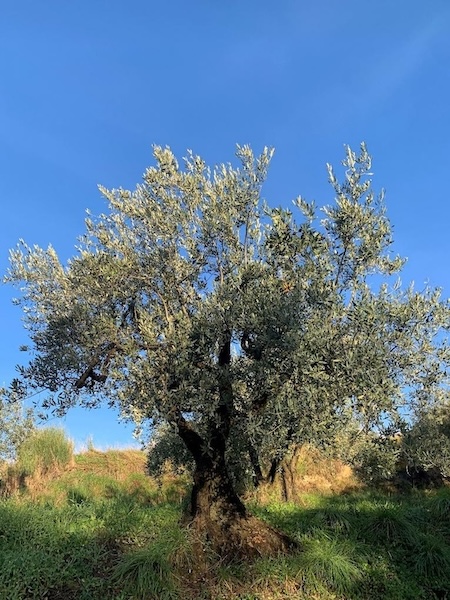Celebrating the International Day of the Olive Tree

The International Day of the Olive Tree, celebrated annually on November 26, is more than a tribute to one of the world’s oldest and most culturally significant trees. It is an acknowledgment of its ecological importance, economic value, and cultural symbolism across millennia. As an enduring symbol of peace, resilience, and sustainability, the olive tree (Olea europaea) holds a unique place in our global heritage. In Nyons and the Baronnies Provençales, it has been cultivated and cherished for some 2000 years.
Antioxidative Power
The olive tree belongs to the Oleaceae family, which includes other notable species such as ash and lilac. Native to the Mediterranean Basin, Olea europaea thrives in the region’s hot, dry summers and mild, wet winters. Its adaptation to semi-arid climates is a testament to its resilience and importance in arid and semi-arid ecosystems. That is why it has blossomed in the Nyons region.
Adaptations and Longevity
The olive tree’s physiological traits are optimized for survival in challenging conditions. For example, its leaves are leathery with a waxy cuticle, reducing water loss through transpiration, and its root system allows it to access groundwater sources, ensuring survival during prolonged droughts. In addition, the tree sacrifices its fruits if summer conditions become too harsh. No wonder why olive trees can live for thousands of years.
Biodiversity Contributions
Olive groves are biodiversity hotspots, particularly when cultivated traditionally as they are in the Baronnies Provençales. These groves provide habitats for various species of birds, insects, and small mammals, contributing to the conservation of regional ecosystems. They also play a role in soil conservation, as their roots help prevent erosion, and the leaf litter enriches soil organic matter.
Economic Importance
The olive industry significantly contributes to the economies of producing countries. Olive oil alone generates billions of dollars annually, with its top producers being Spain, Italy, and Greece. However, the olive industry is not limited to oil production. Table olives, pharmaceutical products, and cosmetics derived from olive leaves and seeds also represent substantial markets.
Proscien is actively engaged in innovating with olive chemistry; we have, for instance, developed a new commercial application extracting antioxidants from olive mill water (Hydroxytyrosol: The Essence of ProActive® Tanche).
Sustainability and Small-Scale Farmers
Olive cultivation supports millions of small-scale farmers who rely on traditional agricultural methods. These practices often align with sustainable agriculture principles, such as reduced chemical inputs and intercropping with other species. Promoting AOP certification—which the Nyons Tanche species has received since 1996—and organic certification programs has further enhanced the livelihoods of smallholder farmers while ensuring environmentally-friendly practices.
Cold-Pressing and Oil Quality
In olive oil production, technological advancements in cold-pressing techniques have improved oil extraction efficiency while preserving its nutritional and sensory qualities. These methods ensure that extra virgin olive oil retains its high levels of antioxidants, such as polyphenols, and a balanced fatty acid profile.
Challenges Facing the Olive Tree
Despite its resilience, the olive tree faces growing threats in the modern era. Rising temperatures, changing precipitation patterns, and extreme weather events threaten olive yields. Heat stress can impair flowering and fruit set, while excessive rainfall increases susceptibility to fungal diseases. Implementation of intensive farming practices, driven by global demand, often lead to monocultures that deplete soil fertility and biodiversity. Balancing market demands with sustainable practices remains a critical challenge for the industry.
A Call for Conservation and Sustainability
The International Day of the Olive Tree is not only a celebration but also a call to action. UNESCO, which initiated this observance, emphasizes the importance of sustainable olive tree cultivation and its role in achieving the United Nations Sustainable Development Goals (SDGs). By promoting traditional practices, fostering biodiversity, and investing in research, we can ensure the olive tree continues to thrive for future generations.
Community Efforts
Local and international initiatives have been developed to preserve ancient olive groves, which are both ecological treasures and cultural landmarks. Reforestation programs and agroforestry models that integrate olive trees with other crops are also gaining traction. The Nyons Olive community that Proscien belongs to is actively engaged in these actions.
The olive tree, with its profound ecological, economic, and cultural significance, embodies resilience and sustainability. On this year's International Day of the Olive Tree, we celebrate not only its past but also its potential to contribute to a sustainable future. By embracing technological innovations, fostering traditional practices, and addressing environmental challenges, we can honour this ancient tree and its enduring legacy.